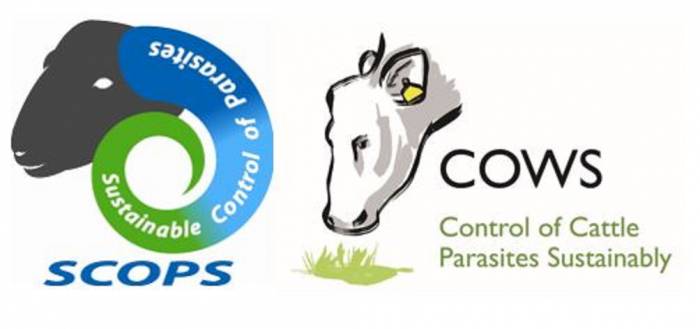14th August 2023
SCOPS has joined forces with COWS, its equivalent group for the cattle sector, to increase understanding of rumen fluke. In a letter in the Veterinary Record, SCOPS and COWS representatives have urged against unnecessary treatment of animals with anthelmintics in response to rumen fluke being reports on FEC reports. This is because of the low likelihood of disease in the presence of adult rumen fluke. Read the letter below and find out more about rumen fluke at www.scops.org.uk/internal-parasites/liver-fluke/rumen-fluke.
Dear Editor
We write on behalf of Control of Worms Sustainably (COWS) and Sustainable Control of Parasites in Sheep (SCOPS), which are independent industry advisory groups that support farmers, vets and other prescribers to control parasitic diseases in cattle and sheep sustainably. In recent years there has been an increase in prevalence in the UK, of the parasite, Calicophoron daubneyi, a rumen fluke found in both sheep and cattle. Diagnostic labs are increasingly reporting the presence of rumen fluke eggs when screening faecal samples for liver fluke eggs, leading to a greater awareness of the presence of rumen fluke in sheep and cattle. COWS and SCOPS are concerned that the presence of rumen fluke eggs in faeces may result in the unnecessary treatment of animals with anthelmintics.
C. daubneyi was first confirmed to be present in UK in 2013 (Gordon et al. doi.org/10.1016/j.vetpar.2013.01.014) and around the same time, two confirmed reports of disease associated with Paramphistomes, one in cattle and one in sheep (Mason et al 2012 doi: 10.1136/vr.e2368; Millar et al. 2012 doi: 10.1136/vr.e7738) were published. Since then, there has been an increase in the number of reports of the presence of rumen fluke (VIDA https://public.tableau.com/app/profile/siu.apha/viz/VIDAAnnualReport2022/VIDAAnnualReport2022) but few reports of clinical disease. Hence, although infection is common, disease, which is associated with large numbers of immature parasites in the duodenum, appears to be rare. There is no evidence in the literature that the presence of adult rumen fluke is associated with disease. A recent study in Northern Ireland showed no significant effect of infection in cattle on cold carcass weight, conformation, fat classification at slaughter and no difference in daily liveweight gain, diarrhoea score or welfare score on farm (Atcheson et al. doi: 10.3389/fvets.2022.968753). There are no ante-mortem diagnostic methods for immature rumen fluke; detection of rumen fluke eggs only demonstrates the presence of the adult parasites in the rumen.
There is no licensed treatment for C. daubneyi in UK. Oxyclozanide has reported efficacy against the adult parasite and can be prescribed under the cascade by veterinary surgeons. A recent survey of over 450 farmers conducted by the University of Liverpool, demonstrated confusion over rumen fluke and found that over 50% of respondents who were using anthelmintics to treat rumen fluke in both sheep and cattle, were using products that were not suitable (i.e. did not contain oxyclozanide) (Hoyle et al. doi.org/10.1016/j.vetpar.2022.109812).
Given the confusion surrounding the significance of rumen fluke in sheep and cattle and the fact that disease, particularly associated with the presence of the adult parasite in the rumen, is very rare, COWS and SCOPS are very keen to promulgate the message that a positive rumen fluke faecal egg count should not trigger anthelmintic treatment.
The liver fluke, Fasciola hepatica, is a common and highly pathogenic parasite affecting sheep and cattle in this country. Resistance to triclabendazole is widespread in Britain (Kamaludeen et al. 2019 10.1136/vr.105209), hence maintaining the efficacy of other classes of anthelmintic is vital to controlling liver fluke. COWS and SCOPS advocate diagnosis of infection and then targeting the stage of the parasite in the animal with the appropriate product. Oxyclozanide is a suitable product to use when animals are infected with adult liver fluke. We are keen that veterinarians and other prescribers discourage the use of anthelmintics unless there is clinical need, and do not advocate treatment for adult rumen fluke infection, as this will increase selection pressure for resistance on parasite populations, importantly, liver fluke.
Results from several research groups suggest that the epidemiology of C. daubneyi is changing (Rondelaud et al. 2022 doi: 10.3390/ani12243566). C. daubneyi shares the same intermediate snail host as F. hepatica and there is evidence that it is adapting to the UK Galba truncatula snail population. However, no data are available to suggest that the parasite is becoming more pathogenic. Whilst it is important that we remain vigilant and aware of the presence of C. daubneyi in UK sheep and cattle, COWS and SCOPS do not advocate use of an oxyclozanide treatment based solely on an incidental positive rumen fluke faecal egg count.
Yours sincerely. Diana Williams (on behalf of COWS), Philip Skuce (on behalf of SCOPS) and Lesley Stubbings (on behalf of SCOPS)
